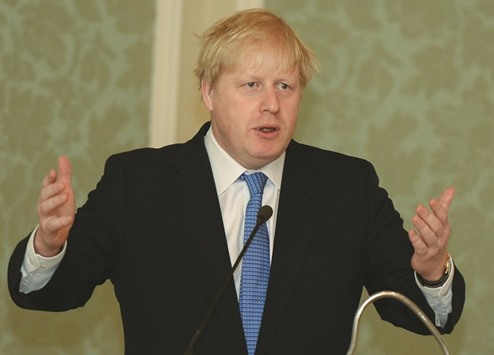Answering questions after his first keynote speech on foreign affairs, Johnson defended his support for free movement of people from the European Union — which Prime Minister Theresa May has promised to end as Britain leaves the bloc.
“I’m a liberal internationalist. I believe that immigration can do great things and when I was mayor of this great city I saw the strength and dynamism that immigration helped to give to the economy,” the former London mayor said. “But what I also said at that breakfast (with ambassadors), is we have to have control.”
Asked by a French journalist about the suggestion that he was saying one thing in private and another in public, Johnson replied in French “not at all”.
Sky News on Wednesday quoted four ambassadors as saying Johnson privately told them he supports freedom of movement, despite leading a campaign that made ending mass migration a key issue ahead of the June referendum on EU membership.
“Johnson has been openly telling us that he is personally in favour of free movement,” one diplomat was quoted as saying on condition of anonymity.
Nick Clegg, former leader of the pro-EU Liberal Democrats, accused Johnson of “treating voters like fools”.
Speaking about Brexit in his speech at the Chatham House think tank, Johnson said observers had been “too quick to draw comparisons with populist movements across the world”.
“There are many people who voted to leave the EU not because they dislike or fear foreigners, but because they believe in democracy... Brexit emphatically does not mean a Britain that turns in on herself,” he said.
Johnson also pledged that Britain will not seek to obstruct greater European defence and foreign policy co-operation as it prepares to leave the EU.
The UK was not bent on the destruction of the EU, and would not adopt a “dog in the manger” stance to disrupt member state co-operation if they continued to meet the goal of spending at least 2% of their GDP on defence.
Other UK ministers have opposed greater EU defence integration, warning that it could represent a threat to the primacy of Nato. But Johnson said: “It is not part of our agenda to seek to undermine or to be dog in the mangerish about the EU.
“There is a conversation going on now about the EU’s desire to build a strong common security defence policy. If they want to do that, fine. Obviously it would be important to get 2% spending on defence. But we are not there to block or impede further steps towards further EU integration if that is what they so desire.”
Some Tory Eurosceptics have openly called for the EU to break up under the pressure of populist revolts in a succession of countries, but the Foreign Office is aware that such an aggressive stance could hamper Brexit negotiations with Brussels.
Johnson gave a strong hint that he remained committed to leaving the EU customs union, saying the UK needed the capacity to strike its own trade deals and act as a “protagonist” for free trade.
He said May’s previous remarks on the EU had “given a very clear picture of how we are going to proceed if you understand the working of the EU”.
“We have already said we are going to cease to apply European law in this country – the judgments of the European court – and we will use this moment to do free trade deals, and be an agitator for global free trade,” Johnson said. “From those two points you can draw all the necessary conclusions about how we see the future.”
It is widely accepted that if the UK stays inside the EU customs union, it cannot legally strike its own free trade deals with third parties.

